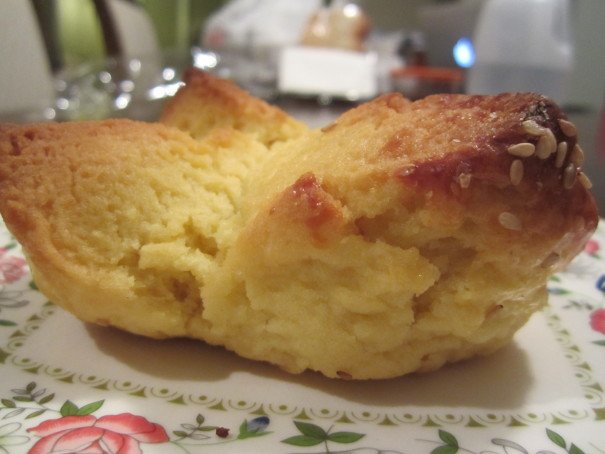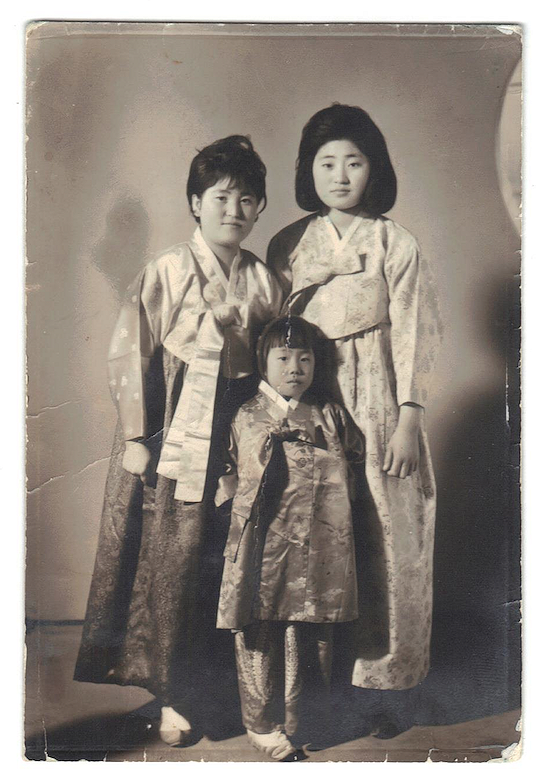
A woman chases her mother’s taste memory of Korean cornbread

Nathan Thornburgh talks to Nicole Choi about connecting with her mother through cornbread.
Stonebread is not the most appealing nickname for a snack, but it invokes nostalgia for the mother of D.C. high school teacher Nicole Choi. This week on The Trip: Drinking with Exceptional People Around the World, host Nathan Thornburgh talks to Choi about chasing, and attempting to recreate, the taste memories of Korean cornbread from her mother’s childhood.
Here is a condensed transcript of the conversation. You can listen to the full episode, for free, on Apple Podcasts, Stitcher, Spotify, or wherever you get your podcasts.
Nathan Thornburgh: What got you interested in this idea of writing about and thinking about Korean cornbread?
Nicole Choi: My mom was talking about how she wanted these certain foods, especially after she was diagnosed with stomach cancer in 2013. And then she got breast cancer in 2015. So especially after that, she realized she had to be very, very careful with what she ate.
So I think that’s what we were talking about initially, and then it became this discussion of what she was craving. Then she started talking about this cornbread My brother actually suggested that we Google it to see what comes up. To my surprise, a lot of things came up, and everyone was talking about this cornbread. And I said this is a story that needs to be told.
Thornburgh: So what did your mom say about this cornbread?
Choi: She described how the texture was really rough and hard, but she wasn’t saying it in a bad way. She was craving it.
Thornburgh: So you and your brother sitting there thinking OK. This is cornbread. It’s rough. You could break a tooth on it. And here is your mom saying, yes that’s exactly what I liked about it.
Choi: Right. And she wanted to taste it and she hasn’t tasted it since she emigrated to the U.S. 44 years ago. We were actually in Korea last summer—and I can’t remember exactly where we were—but it was a bakery and the advertisement outside said 1966 cornbread. So we bought a piece. We were skeptical, and we were right. My mom said it didn’t taste the same.
Thornburgh: So even in Korea they’re chasing this flavor and texture, and they can’t get it. What did you and your brother find when you researched the cornbread?
Choi: I saw Connie Park’s dissertation at the University of Leiden. She had an entire chapter on Korean cornbread and how it’s distributed to school children. I was describing it to my mom. And you know my mom was just shaking her head agreeing especially when she heard the nickname stone bread. I found it amazing that other people, including food bloggers, were talking about it.
Thornburgh: Yeah so that’s what you’re finding that you have this entire diaspora mobilized to try to recreate this cornbread. What do you know about the kind of history of that?
Choi: So after the Korean War, South Korea was obviously very poor and struggling. The U.S. donated powdered milk and cornmeal to be distributed to children at certain schools. According to the dissertation, these were very remote schools and kids received free lunches. Sometimes the powdered milk—they wouldn’t cook it properly, which would give kids diarrhea. So, a lot of people just threw it out because it had a bad reputation. Cornmeal was initially made into gruel, but it took a lot of labor. Then, I guess, the idea making it into bread with the powdered milk came up.
Thornburgh: So this would have been like a major part of a school child’s diet during this very specific window of time in history?
Choi: Right. But then my mom when she lived in Dongducheon, which is where she was born and where she received that cornbread. She said she didn’t receive it anymore when she moved to a different city closer to Seoul. So I think it really was restricted to the schoolchildren who were in these remote areas that were farther north.
Thornburgh: That’s interesting because it’s, of course, a donation, but it’s also kind of a cynical project right. We did this in Japan after the war certainly in Korea we’re looking for markets not necessarily friends. How does your mom feel about the fact that you know this was part of her diet?
Choi: I think she’s just grateful. I don’t think she has any feelings or resentment. If anything, it was just a new food she was introduced to.

Thornburgh: What about you? You obviously spent time thinking about this reading about it. Is it different from generation to generation, the ideas of like what that relationship actually looks like?
Choi: I guess I don’t like the idea of it. I’m not entirely comfortable with the idea that the U.S.—under terms of being friendly—just wanted to groom school children to become consumers of American food. However I was doing a little bit more research and I saw that between 1961 and 1963 there was the food initiative, where the agricultural surplus in the U.S. was being donated to foreign countries.
Choi: So when I read that I felt a little bad for sharply criticizing the effort.
Thornburgh: What happened when you tried to make the cornbread?
Choi: We saw one recipe, and my mom saw that it looked very hard. She’s thought that might be the right one, but she’s said the shape was off.
Choi: I didn’t do the recipe correctly, so what I ended up with it looked kind of like polenta.
Thornburgh: How reliable do you think your mom’s memory of the cornbread?
Choi: And she’s admitted that she might not remember it correctly. She said that when you describe the cornbread, it does not sound appetizing.
She actually questions if she was just very hungry and just appreciated the fact that they gave her two pieces of cornbread a
Thornburgh: Well I’m going to say that our listeners are going to make such incredible powdered milk Korean bread that your mom is going to be re-inspired, and you will get back on Google and read more dissertations and more food bloggers and finally nail that tooth-crunching bread from her youth. That’s my that’s my goal for this.
Thank you for coming and talking with us about your family.
Choi: Thank you.
This conversation was edited and condensed. Listen/subscribe to the podcast on Apple Podcasts, Spotify, or Stitcher.